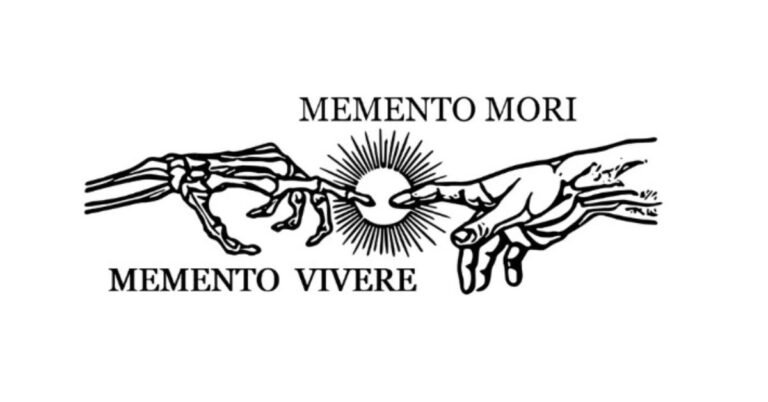“Memento mori, memento vivere” is a profound Latin phrase that translates to “Remember you must die, remember you must live.” It reflects a timeless philosophy that encourages us to acknowledge both the inevitability of death and the importance of living life to the fullest. In this article, we will explore the deep meaning of this phrase, its origins, and how it can inspire a balanced, meaningful life. We will also compare the philosophical implications of “memento mori” and “memento vivere” and examine how they interact to create a powerful message for modern life.
Understanding the Origins of “Memento Mori” and “Memento Vivere”
Memento Mori: The Reminder of Mortality
The phrase “memento mori” literally means “remember death” in Latin. It serves as a reminder of the inevitability of our mortality. In ancient Rome, this concept was often depicted in art, such as skulls, hourglasses, and wilting flowers, which were used to remind individuals of their fleeting existence. It urged people to reflect on their lives and prepare for their eventual end, encouraging them to live with purpose and meaning.
“Memento mori” became particularly significant during the medieval and Renaissance periods, where it was used in religious contexts to remind individuals of the transient nature of earthly life and the importance of focusing on the afterlife. The notion of contemplating death was not meant to lead to despair but to encourage people to live virtuously, make meaningful choices, and align their actions with their deepest values.
Memento Vivere: The Call to Live Fully
On the other hand, “memento vivere” translates to “remember to live.” While “memento mori” reminds us of death, “memento vivere” calls us to focus on life. It encourages individuals to embrace the present, appreciate the beauty of the world around them, and pursue their passions with vigor. Life is not just about preparing for death; it’s about making the most of the time we have, cherishing relationships, and savoring the experiences that make us feel truly alive.
In many ways, “memento vivere” is a call to be mindful of the present moment. By remembering to live, we are encouraged to fully experience life, despite its inevitable end. It promotes a sense of urgency to act now, to live with intention, and to seek joy, growth, and fulfillment in all that we do.
How “Memento Mori, Memento Vivere” Creates a Balanced Philosophy
The combination of these two powerful phrases—”memento mori” (remember death) and “memento vivere” (remember life)—creates a balanced approach to living. Together, they offer a holistic perspective on existence, reminding us that both death and life deserve our attention.
Finding Meaning in the Mortality of Life
By acknowledging death, we open ourselves to a deeper understanding of what it means to live fully. The awareness of our mortality can serve as a motivator to live authentically. When we accept that time is limited, we become more intentional in our decisions. Instead of wasting time on trivial matters or living in fear, we are encouraged to focus on what truly matters—our relationships, our passions, and the legacy we leave behind.
“Memento mori” teaches us to embrace the impermanence of life. It encourages us to live with purpose, understanding that we may not have forever to accomplish our dreams. It instills in us a sense of urgency, urging us to focus on the things that matter most and to make every moment count.
Living to the Fullest
In contrast, “memento vivere” reminds us to enjoy the present and take full advantage of our time on Earth. It calls us to take risks, follow our dreams, and embrace the world with open arms. While it’s essential to acknowledge death, it’s equally important to savor the joys of living. Life offers countless opportunities for growth, adventure, and connection, and “memento vivere” encourages us to take them.
The message of “memento vivere” is that life should not be lived in the shadows of fear or anxiety. Rather, it should be embraced with enthusiasm and passion. It encourages us to live authentically, seek personal fulfillment, and be present in every moment.
The Philosophy of “Memento Mori, Memento Vivere” in Daily Life
The Role of Reflection
To integrate “memento mori” and “memento vivere” into our lives, we must first cultivate a habit of reflection. By regularly contemplating our mortality, we are reminded of the preciousness of time. Reflection on death does not mean living in fear or sadness but rather approaching life with intention and clarity.
Taking time each day to reflect on the transient nature of life helps us prioritize what truly matters. Are we spending time on meaningful activities? Are we nurturing the relationships that enrich our lives? Reflection on mortality helps us focus on our purpose and align our actions with our deepest values.
Embracing the Present Moment
On the other hand, “memento vivere” encourages us to be mindful of the present moment. In today’s fast-paced world, it’s easy to get caught up in the rush of life, constantly thinking about the future or worrying about the past. “Memento vivere” urges us to slow down and savor life as it is.
Whether it’s taking a walk in nature, enjoying a meal with loved ones, or pursuing a creative passion, we are reminded to embrace the here and now. Life is fleeting, and by living fully in the present, we honor the essence of “memento vivere.”
The Benefits of Living with Both Memento Mori and Memento Vivere
When we strike a balance between “memento mori” and “memento vivere,” we create a life that is both meaningful and fulfilling. Let’s explore some of the key benefits of living with this dual perspective:
1. Increased Purpose and Clarity
By acknowledging our mortality, we bring a sense of urgency to our actions. We are more likely to pursue goals that align with our values, knowing that time is limited. “Memento mori” helps us focus on what truly matters and avoid wasting time on distractions.
At the same time, “memento vivere” encourages us to take full advantage of our time, helping us appreciate the present and pursue our passions without hesitation.
2. Deeper Appreciation for Life
Contemplating death doesn’t make life feel less meaningful; it makes it more precious. The awareness of mortality gives us a deeper appreciation for the small moments, the beauty of nature, and the joy of human connection. By embracing “memento vivere,” we learn to appreciate life in all its forms, both the ordinary and the extraordinary.
3. Balanced Approach to Stress and Anxiety
In a world where stress and anxiety are common, the balance between “memento mori” and “memento vivere” provides a healthy perspective. The awareness of death encourages us to let go of trivial worries and focus on what truly matters. At the same time, living fully in the present moment helps us reduce stress by teaching us to embrace life as it comes, without being consumed by fear or anxiety.
4. Authentic Living
When we acknowledge both life and death, we are motivated to live authentically. We are more likely to pursue what makes us happy, spend time with those who matter most, and live with intention. This philosophy encourages us to be true to ourselves, free from the constraints of societal expectations or superficial concerns.
A Comparison of “Memento Mori” and “Memento Vivere”
To summarize the balance between these two powerful concepts, here’s a comparison chart:
| Aspect | Memento Mori | Memento Vivere |
|---|---|---|
| Meaning | Remember that you must die. | Remember that you must live. |
| Focus | Mortality and the impermanence of life. | Embrace the present and live fully. |
| Philosophical Purpose | To inspire reflection on the fleeting nature of life. | To inspire action, passion, and enjoyment of life. |
| Key Message | Time is limited—live with purpose. | Enjoy every moment—life is to be savored. |
| Impact on Stress | Helps reduce anxiety by confronting death. | Reduces stress by promoting mindfulness and presence. |
| Resulting Behavior | Prioritizing what truly matters. | Engaging in meaningful, joyful activities. |
Conclusion: Living with Balance
“Memento mori, memento vivere” is a reminder that life and death are interconnected. By acknowledging our mortality, we find meaning in every moment, and by embracing life, we make the most of our time on Earth. Striking a balance between these two concepts helps us live with purpose, joy, and authenticity.
The next time you face challenges or feel overwhelmed by the complexities of life, remember this powerful phrase. Reflect on both life and death, and use this dual perspective to guide your actions, prioritize your relationships, and savor every precious moment.

